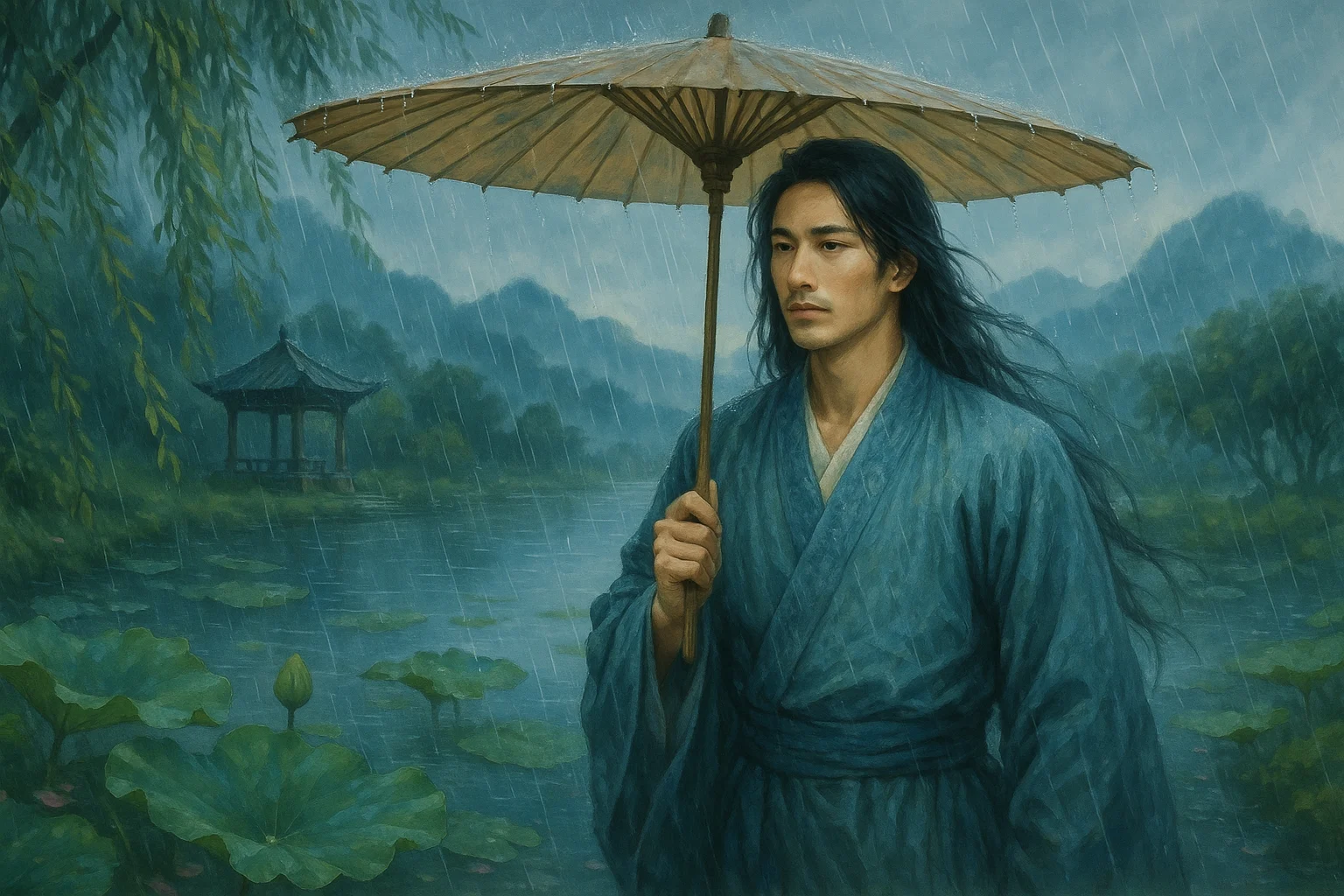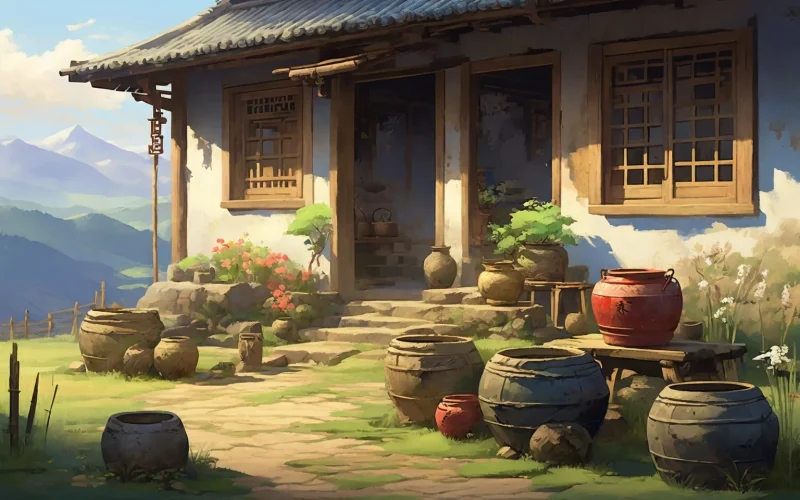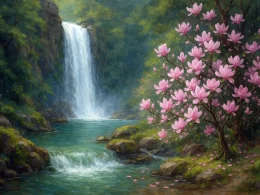My hut lies buried in weeds—how sad the sight!
The lone town just calmed from the battle’s blight.
By the fence, a worn-out shoe remains,
In the house corner, torn books retain.
I shame before birds soaring the clouded height,
And envy fish diving the depths outright.
Guests come—no fine feast can I afford,
So I pick wild herbs from the hill, my humble board.
Original Poem
「兵乱后杂诗」
吕本中
蜗舍嗟芜没,孤城乱定初。
篱根留弊履,屋角得残书。
云路惭高鸟,渊潜羡巨鱼。
客来阙佳致,亲为摘山蔬。
Interpretation
This poem was composed shortly after the An Lushan Rebellion (755–763 CE), a cataclysmic event that shattered the Tang Dynasty’s golden age. Amidst smoldering ruins and fractured lives, Qiwu Qian documents the visceral aftermath—where personal and national devastation intertwine. His verses oscillate between lament and resilience, mapping the topography of loss while clinging to fragile embers of hope.
First Couplet: "蜗舍嗟芜没,孤城乱定初。"
Wō shè jiē wú mò, gū chéng luàn dìng chū.
My snail-shell hut sighs beneath choking weeds,
the lone city just staggered from chaos.
The opening juxtaposes micro and macro ruins. "Snail-shell hut" (蜗舍) reduces the poet’s dwelling to a fragile, coiled space—a metaphor for lives contracted by war. "Choking weeds" (芜没) evoke nature reclaiming human absence, while "staggered from chaos" (乱定初) captures the precariousness of early recovery, where "peace" feels more like exhaustion than resolution.
Second Couplet: "篱根留弊履,屋角得残书。"
Lí gēn liú bì lǚ, wū jiǎo dé cán shū.
By the fence-root, a rotting sandal lingers;
in the house-corner, I salvage torn books.
These lines excavate war’s intimate debris. The "rotting sandal" (弊履), perhaps once a neighbor’s or the poet’s own, embodies forsaken daily life. "Torn books" (残书) symbolize fractured knowledge—their rescue ("salvage" 得) hints at Qiwu’s scholarly defiance: even fragments must be pieced back into meaning.
Third Couplet: "云路惭高鸟,渊潜羡巨鱼。"
Yún lù cán gāo niǎo, yuān qián xiàn jù yú.
I shame beneath clouds where high birds soar,
envy great fish gliding through abyssal dark.
Here, fauna becomes foil to human frailty. Birds (高鸟), unscathed by terrestrial ruin, highlight the poet’s grounded despair; fish (巨鱼), moving freely in unseen depths, mirror his longing for refuge beyond reach. The couplet’s vertical axis (sky/abyss) maps his psychological confinement—neither flight nor dive offers escape.
Fourth Couplet: "客来阙佳致,亲为摘山蔬。"
Kè lái quē jiā zhì, qīn wèi zhāi shān shū.
A guest arrives—no feast to offer,
so I pluck mountain greens myself.
The finale pivots to stubborn humanity. "No feast" (阙佳致) lays bare material scarcity, yet "pluck mountain greens" (摘山蔬) transforms survival into hospitality. This gesture—humble, hands-on—epitomizes Tang resilience: civilization rebuilds one weed, one act of kindness at a time.
Holistic Appreciation
The poem begins with the poet’s war-torn dwelling, unfolding layer by layer from desolate surroundings to psychological reflections, then to interactions with guests. It paints a vivid tableau of post-war life. Realistic depictions of the environment—"overgrown ruins," "worn-out shoes," "tattered books"—interweave with introspective glimpses into the poet’s psyche, such as "feeling ashamed before soaring birds" and "envying the vast fish." The poem concludes with the humble gesture of serving mountain vegetables to guests, revealing genuine warmth within simplicity. Concise yet profound, it balances sorrow with tenderness, desolation with hope, showcasing the poet’s resilience, integrity, and humanity amid adversity.
Artistic Features
- Microcosm Revealing Macrocosm, Emotion Embodied in Scenery
Through the depiction of a dilapidated home, the poet mirrors the collective trauma of a war-ravaged society. Small objects resonate with epochal significance. - Vivid Detail
Images like "worn-out shoes" and "tattered books" are tangible and evocative, enhancing the poem’s visual immediacy and lifelike authenticity. - Symbolism to Express Aspiration
"Soaring birds" and "vast fish" symbolize talent and ambition, conveying the poet’s yearning for freedom and an ideal existence. - Climactic Turn, Emotional Resolution
Ending with the scene of serving wild vegetables to guests not only illustrates the poet’s humble life but also amplifies human warmth and personal dignity.
Insights
This poem is both a portrayal of post-war reality and a spiritual confession. It teaches us that even in dire circumstances, one must preserve sincerity of character and warmth of spirit. Amidst ruins, the poet clings to books and human connection—much like flowers blooming in desolation, symbolizing enduring hope. More importantly, this stance of upholding spiritual values in adversity sets a precedent for living with dignity and compassion, offering future generations a model of meaningful existence.
About the Poet

Lü Benzhong (吕本中 1084 - 1145), a native of Shouxian in Anhui, was a renowned poet and Neo-Confucian scholar of the Southern Song Dynasty. As a key theorist of the Jiangxi Poetry School, he proposed the concept of "living method" (huofa), advocating for natural variation within established poetic rules. With over 1,270 surviving poems, his Genealogy of the Jiangxi Poetry School (Jiangxi Shishe Zongpai Tu) established Huang Tingjian as the school's patriarch, profoundly influencing Song poetic theory and serving as a bridge between the Jiangxi School and the Four Masters of the Mid-Song Revival.












